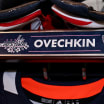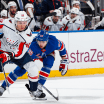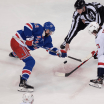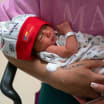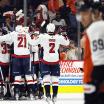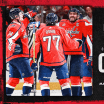Earlier this season, we posted Alex Ovechkin](https://www.nhl.com/capitals/news/early-times-of-the-great-eight/c-311761890) and another Nicklas Backstrom](https://www.nhl.com/capitals/news/backstrom-takes-center-stage/c-313921356). In the process of crafting those stories and talking to the subjects themselves and many others, we were reminded of how exciting and thrilling the 2007-08 NHL season was in these parts.
It stands as Ovechkin's career year, it was Backstrom's rookie year, Bruce Boudreau took over behind the Washington bench on Thanksgiving Day, and the Caps made the playoffs for the first time in five years, winning 15 of 19, 11 of 12 and seven straight at season's end to come back from a dismal 6-14-1 start to win the Southeast Division title.
That season and that run into the playoffs augured in the "Rock The Red" era of hockey in DC, the beginning of 11 playoff appearances in a span of a dozen seasons. At this time a dozen years ago, the Caps were in the midst of that wild run. With the NHL's 2019-20 season "paused" for the foreseeable future, we're going to spend the next month looking back at the day-to-day of that remarkable late-season run, revisiting some of our coverage at the time with some fresh hindsight mixed in. On the off days between games, we will revisit some events from earlier in that landmark season. Enjoy!
Time CAPSule - McPhee Engineers a Memorable Trade Deadline Haul
McPhee fills needs and then some, adding three key pieces in deadline deals aimed at propelling Caps into playoffs
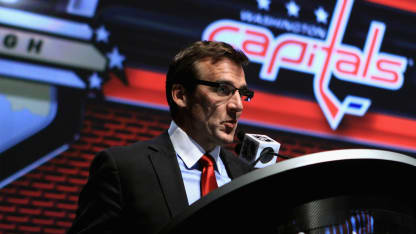
Monday, April 7, 2008
A dozen years ago, the Caps started the business of preparing for their first foray into the Stanley Cup playoffs in five years. It was the first taste of the playoffs for Washington's "Young Guns," and they had the luxury of the latest-starting series of the eight first-round match-ups that spring. While every other series started on either Wednesday or Thursday, the Caps and Flyers had to wait until Friday night to get their series started in Washington.
That gives us a few days to look at some occurrences earlier in that pivotal 2007-08 season here in Washington.
Once Bruce Boudreau took over behind the bench on Nov. 22, 2007 and soon after the Caps started their steady climb up the standings ladder, it became clear that they would need a boost in personnel to overcome their 6-14-1 start if they were going to reach the playoffs.
Caps GM George McPhee signed center Michael Nylander to a four-year deal as a UFA the previous summer, and the Swedish pivot delivered 11 goals and 37 points in the season's first 40 games, giving the Caps good bang for their buck on that deal. But midway through January, Nylander was lost for the season with a torn rotator cuff leaving the Caps with a big hole in their center ice depth chart.
With Nylander out, the Caps were running with rookie Nicklas Backstrom, third-year center/left wing Brooks Laich and Boyd Gordon and David Steckel up the middle.
McPhee also had goaltending concerns. Olie Kolzig was 37 that season, and after a solid October in which he fashioned a 2.30 GAA and a .922 save pct. for a team with an unremarkable 5-6-0 record at that stage of the season, he posted three straight months with a GAA above 3.00 and a save pct. below .900 for a rapidly improving club.
In his 17 years in the GM's chair, McPhee arguably engineered his most impactful trade deadline performance in 2007-08, making three deals on trade deadline day, Feb. 26, 2008. Those deals filled the team's two most pressing needs, bringing future Hall of Fame center Sergei Fedorov and goaltender Cristobal Huet into the fold. McPhee also upgraded his team on the wing, sending Matt Pettinger to Vancouver for impending free agent winger/super pest Matt Cooke.
Washington had 18 games remaining after the deals were done, and all three additions were crucial cogs as the Caps rolled up a 14-4-0 record over that span, winning the Southeast Division crown on the season's final day.
Here is a look at our coverage of that trade deadline, including a piece written days before the deadline and another just after the dust settled. In between those pieces are some quotes from McPhee's press conference five days before the deadline.
\\\\\\
McPhee Maps Out Deadline Day Strategy
For the last four years, Caps general manager George McPhee has diligently collected assets in the form of young players and draft picks. For the next four days, his peers from around the league will attempt to pry away some of those young players and draft picks.
From the time that the high hopes and high payroll of the 2003-04 Capitals and that hockey season fizzled and dissolved like an Alka Seltzer tablet, the stated intention of the Caps' organization was to build a team that was capable of competing for Stanley Cup championships year-in and year-out. Washington might get its first kick at the Cup in five years this spring, but the battle for playoff positioning in the Eastern Conference is a spirited one. Thirteen teams are still skirmishing for the eight available postseason berths.
The Caps are one of those 13 teams. Just a few points off the modest pace in the Southeast Division, Washington still holds some hope of winning the division for the first time in seven years, a feat that would give it a home-ice seeding for the first round of the playoffs. The Caps could also still wind up with a lottery pick in the NHL draft for the fourth time in the last five years.
The NHL's annual trade deadline looms; the swapping store closes promptly at 3 p.m. on Tuesday (Feb. 26). Between now and then, the Caps must play two hockey games and McPhee and his staff must decide what course the team will chart for the remainder of the season.
Should the Caps bolster the roster for a run at the Cup this season? Stand pat and hope to slink into the postseason as currently constituted? Tweak the roster gently and in the hopes of gaining the inside track on the divisional race, because anything can happen once you get in? Add some cheap depth? Replace some of the important veterans whose presence in the lineup is missed more and more with each passing game?
We'll know by this time next week, but strong cases can be made for virtually every possibility. We do know that the Caps won't be sellers as they have been at the last three trade deadlines.
"We're not selling," McPhee firmly states.
McPhee spent the early part of this week with the other 29 GMs in the league. The group convened for their annual meetings in Naples, Fla. to discuss potential rules changes, the state of the game and other pertinent hockey related matters. Sprinkled among all that was a bit of trade talk as teams look to firm up their rosters for the stretch drive.
"Everybody talks to everybody, just to find out what they're looking for," says McPhee, of the Naples discussions. "People have different styles. Some people are really forthcoming, some people play it [close to the vest]. I haven't hesitated to tell people what we might be interested in doing."
And what might George be interested in doing?
"We really like the team we have," he says. "We're really happy with how this team has come along. We have some terrific young players and some good vets and we're going to continue to play [with them].
"If there is something that would help and isn't too expensive, then we would certainly talk about it. But we like what we have. We like the players we have and the people they are. And we have people in Hershey that can come up and help.
"We've done a very good job of developing this team. To start trading things out that could be part of the future of this team makes no sense. We had a power play late in the game [Wednesday] night and five kids jumped over the boards; their average age was probably 21 or 22. It's pretty darned good. We've got to keep playing them if we want to be going for a Cup."
The five players to which McPhee referred are: Alexander Semin (almost 24), Tomas Fleischmann (23), Alex Ovechkin (22), Mike Green (22) and Nicklas Backstrom (20). All but Fleischmann were Washington draft choices.
At this time of the season, teams whose playoff hopes have vanished try to do what McPhee has successfully done over the last few years: accumulate young prospects and draft choices.
"The calls are slowly starting to come in now from general managers basically saying, 'We're on the bubble and we're going to see here over the next week or 10 days whether we're a buyer or a seller," said Red Wings general manager Ken Holland in a conference call last week. "And if you look at last year's trade deadline, there was some real steep prices paid and ultimately only eight teams can win a playoff round.
"We're three years into the CBA," noted Holland. "We're starting to get in my opinion a real feel that the draft developing in the back end of your roster have to be cheaper players. If you don't have those players through the draft, through development, where do you get them? And I think teams are going to have to make harder decisions about trading first-round picks and real good prospects. I'm not saying it's not going to happen. But I think as we go along here it's going to be harder and harder to do just because of the way the CBA is starting to flush itself out now.
"We're starting to get into the system, and I know in our case we've got 15 players on our roster that make a million two or less. And over the next two or three years some of those players will retire. Some of those players will move up into our group where we're going to pay them more. How do you fill out the back end of the roster if we continually trade away high picks and prospects?"
Every general manager in the league must realistically assess his team's chances of winning it all, and weigh that against the cost of what it would take to bring in big-name and/or high-salaried players at the deadline. And even then, there are no guarantees. The biggest trade at last season's deadline was Nashville landing star center Peter Forsberg for two players and two picks. Forsberg scored two goals and totaled 15 points in 17 regular season games with the Preds, and added two goals and four points in the playoffs. But Nashville was bounced out in the first round.
It's not just the buyers that have to beware.
"There are a lot of teams right on the bubble right now," says McPhee. "So they don't know whether they're selling or buying.
"You've got to be careful when you're selling. If you're three points out of a playoff spot and you start selling off, it's not a good message for your fans. We did it the last few years because we were far enough out of it that it was the right thing to do. It's a darned good league this year. It's great that so many teams are in it. Nobody is really going to know who is in and who's out until the last couple games of the season, for about eight teams. It's pretty impressive."
It's impressive, but it's limiting the number of sellers. That may in turn skew supply and demand and drive up prices. Because races are so tight and only a few teams have fallen far off the pace, there is a large disparity between buyers and sellers this season.
"If you can make a deal you believe improves your hockey team," said Flyers GM Paul Holmgren in last week's conference call, "chances are you're going to move forward. I think right now there hasn't been a lot of movement to date so far, and I think that's probably more due to, A, the salary cap, and, B, the closeness of the league. It's unbelievable how close it is right now.
"And I don't see a whole lot of separation between now and the deadline either. So it's going to be interesting to see what transpires.
Another factor is the new post-lockout CBA. The new agreement has changed not only the league's economic landscape, but also the way the general managers do business. Impactful in-season trades have all but dried up.
"It's harder for managers now," starts McPhee, "because you could quite often say, 'I don't like what's available now so we're not going to do it because we'll pick something up along the way.' But there is so much less of that now.
"I can think of instances in the past where we didn't sign a [Rick] Tocchet and a [Brian] Bellows became available to us late in the year. We couldn't get [Craig] Berube's deal done, but Jim McKenzie was available to us later in the year. That doesn't seem to happen as much anymore, and it's harder for management because you feel like if you don't get it done in the summer, you don't get it done.
"It's a lot easier making decisions on your team during the season when they're in front of you every day and you're watching every practice and every game. Things are clearer. Doing it in the summer is hard."
Free agency gives GMs a chance to re-shape their teams over the summer, but even that avenue is undergoing a gradual reconstruction.
"We've all realized working with free agency, teams are tying up players for longer term and I think you'll see less and less top players hit the market on July 1st," Holland said. "And to me that really puts the importance on drafting and developing. And you need to have home grown talent, because you can't rely on July 1st. [When] the players do hit the market, everybody's got money."
One of the reasons the Caps are in the position they're in - looking to buy (or at least window-shop) - is because they've drafted well the last few years. And one of the reasons they've drafted well is they've been able to put more picks in the quiver. The value of top picks seems to rise a bit each year, and with one of the best draft classes in recent years in the offing this June, those picks could be gold in the next few days.
"We've done a good job with draft picks, too," says McPhee. "We've got a first [rounder] and three seconds in a real strong draft. Next year is a good draft and we've got a first and two seconds for that one. We've gone to the draft the last few years and made some real good picks and at the same time increased the number of picks we have.
"We'll use them the right way. If there is something there that makes sense, then we would use a pick to do it. But we'd much rather be sitting at the draft table than trying to nail it and acquire more good players for the organization."
It's a seller's market at the moment. Plenty of teams are looking for a late push, but few teams have given up the ghost and are willing and ready to start shipping away assets.
"Everybody in the league is looking," said Holland. "This time of the year everybody can use a top six forward. And you can never have enough D. And I look back toward our run last year, the Final Four, when we lost [Niklas] Kronvall before the playoffs started and we lose [Mathieu] Schneider in the San Jose series.
"I thought that [Danny] Markov and [Chris] Chelios and [Andreas] Lilja did a tremendous job stepping up the minutes. Last year we had really seven NHL defensemen, experienced NHL defensemen. This year we have six. Derek Meech. He's a rookie we like the way he's played, but he's a rookie. This time of the year you're looking for experience. Again, everybody would love to have a top six forward or a number four, number five defenseman. Everything depends on price."
McPhee is typically not being specific about his needs, but the Caps could use help up front and in the back, and could use an injection of experience, too. But like Holland and McPhee both say, it all comes down to price.
"I think every team depends on the depth of prospects," said Holland, "and depends on where your team is age-wise and I think different decisions for different teams certainly expect to see lots of trades between now and trade deadline day. I'm interested like everybody else to see who is going to step up and pay some steep prices. But I certainly think in two or three players' cases you hear some rumors out there that somebody is going to pay a pretty good price."
Washington is in a tightly contested battle for the Southeast Division crown, which may prove to be the only playoff berth the division produces. But McPhee won't be reacting to any deadline moves the other Southeast teams might make.
"It's like playing your opponents [on the ice]," says McPhee. "You worry more about what you're going to do than what they're going to do. We like the way our team has come along. We've always said this whether it's in October or the trading deadline: If there is something you can do that makes sense to help your team, then you do it. Otherwise, we like what we have."
And McPhee won't be pressured into making a deal he isn't comfortable making, either.
"There is pressure every day in this business with every decision you make," he declares. "We're going to stick with this plan that is working so well for us."
"We make more mistakes at the trade deadline than we make the whole rest of the year combined," said Anaheim GM Brian Burke in last week's conference call. "The pressure to win is so intense and unrelenting and unremitting that we as a group make horrible, horrible decisions at the trade deadline."
Early in the season, it didn't look as though the Caps would be close enough to consider themselves possible buyers at the deadline. Being where they are at this stage qualifies as a minor achievement.
"We thought that if everything went right we could be where we are now," recalls McPhee. "Things actually didn't go right for us early on and we got to where we are now. We just hope that we can continue to play well to make it happen this year. It would be great.
"We've had a lot of injuries and a slow start, but we're there. We told the players after the [Dec. 17] game in Detroit, 'We're a good team now and we're going to be heard from for the rest of the season.' That's what's happening. Who knows who will make the playoffs, but it would be nice if it was us."
\\\\\\
Blog Entry with quotes from McPhee media availability on Feb. 21, five days before deadline:
On Jeff Schultz's strained knee:
"He seems better than expected today, but it's hard to say with these things. Try it tomorrow and see how it is. Then go from there."
On Sami Lepisto's one game with the Caps:
"He played very well. He's a smart player and he moved the puck real quick. Quick ups, which is what you want. He gets it and moves it up, gets it and moves it up. He was doing it in motion. He can, while he's retrieving the [puck], be moving and cradling the puck and then seeing someone and moving it. Those are his strengths and there is certainly room for guys like that in today's game."
On whether he believed there was a lot of trade talk at the GM meetings in Naples:
"That's always hard to measure because unless you're spying on people, you don't know who's talking to who. You can see people talking from time to time, but you don't know whether they're having a social talk or they're talking deal. Sometimes you can tell from the body language that it's serious. And some guys are doing it because they don't care what other people think. Some guys are doing it to make sure their competition knows what they're trying to do. But it's hard to say how much is going to happen. It's probably like every other year where really nothing happens and then there are 40 transactions a couple days before the deadline."
On the recently concluded GM meetings:
"The meetings themselves were really good. I've always enjoyed those meetings because you really have comprehensive discussions about hockey issues and there is a lot of responsibility there to do what's right for the NHL and hockey all over the world, really. A lot of people follow what we do in this league. We usually have about 40 items on the agenda to talk about. We break into small groups of six to eight GMs on the first day with a couple of league people and then we discuss six or eight items and then make recommendations to the larger group and then sometimes there is more discussion based on that. That's how we do it and it's enlightening when you have a lot of experienced people in the game talking about the game at this level. It's a neat experience to be a part of."
On injured defenseman Brian Pothier:
"He is still having symptoms. There is just no timetable for this. Whenever he walks in and says he is feeling good, you get him going. He could walk in tomorrow and say, 'I feel good today,' string a couple more good days together and the next thing you know he is skating and playing in a few of weeks. But I don't know."
On injured right wing Chris Clark:
"He seems to be getting better. But until we see him out there going all out in practice for a few weeks [he will remained sidelined]."
On whether he thinks the goaltending tandem of Olie Kolzig and Brent Johnson could remain in place for next season:
"I'm not looking that far ahead. We're just trying to win games right now and at the end of the season you evaluate every position like we always do. This isn't about next year. This is about right now, and we're doing fine."
On the logjam of young goaltenders in the system:
"The plan would be to have all the young goalies in Hershey and let them battle it out down there."
On whether one of the young goalies would have to be loaned out to another organization:
"We'd have to do something, but it's a nice problem to have, three good young goalies. We'd work something out. Our plan would be to get them all to camp and get them to work."
On Tomas Fleischmann:
"He is a talented young guy and players develop at different rates. He is a smart player and he's got good hands. This is his first [full] year in the league and he is doing fine. They can't all be Ovechkins. You have to have young guys at reasonable deals in your lineup. Everybody has to have it. There aren't many teams that can have a lineup full of expensive players. You have to play guys like Flash and hope they continue to come along."
\\\\\\
Caps Land Trio of Players on Deadline Day
For several days heading up to Tuesday's NHL trade deadline, all was seemingly quiet here in Washington and around the NHL on the trade front. Few deals were made, and with few teams out of the playoff chase, it looked like deadline day might come and go rather quietly.
That all changed early on Tuesday when the Caps unveiled a trio of trades that clearly positions Washington as a team that intends on making a run to the playoffs this spring.
First, the Caps sent a second round choice in the 2009 NHL Entry Draft - the pick acquired last November from Anaheim in exchange for center Brian Sutherby - to Montreal for goaltender Cristobal Huet.
"You just never know going into the deadline what's going to transpire," says Caps general manager George McPhee. "We didn't anticipate a lot happening, but when the Huet deal came along that was one that was hard to lay off of."
Later in the day, the Caps send defenseman Theo Ruth - a player Washington chose in the second round of the 2007 draft - to the Columbus Blue Jackets in exchange for veteran center Sergei Fedorov.
One of the game's elite players in the 1990s, the 38-year-old Fedorov has slowed a bit since he was winning Stanley Cups with the Detroit Red Wings.
"The Fedorov one," begins McPhee, "with losing [Michael] Nylander [to a rotator cuff injury] I was trying to find another center without giving the future away. The price seemed right on that.
"Like every great fighter, you hope he's got one good fight left in him. He's playing for a new contract. We hope that we can get him here and have him play as well as he has played in a long time and see if it makes our club better.
"You've got a veteran guy who has had success in this league, is good on face-offs, he's good defensively and he can still make a play. He doesn't have to be the go-to guy like he has been in the past. He has to fit in and help us."
Finally, the Caps swapped winger Matt Pettinger to Vancouver in exchange for center Matt Cooke.
"Matt Cooke and Pettinger," says McPhee, "we had talked about that before probably three or four times over the last two or three months as something that both clubs might conside. With Petty I was hoping that he would play through and get scoring again. When it wasn't happening, I thought Vancouver would be a good fit for him and Cooke could help us."
The moves give Washington goaltending depth, a scoring line center and a feisty checking line forward.
This is the biggest splash Washington has made at the deadline as a "buying" team since it swung a six-player deal to bring center Adam Oates from Boston to the District on March 1, 1997. The Caps fell just short of making the playoffs that spring, marking the first time in 15 seasons they missed the dance.
"Ted was all for it," says McPhee, speaking of Caps majority owner Ted Leonsis. "Ted was really happy with what we accomplished. Ownership made it clear that if there was something there that gives us a push, we could go ahead and do it. There are no real commitments for the future, we didn't give up the future when we did it and I think the prices were reasonable. I think we did a good job.
"When you lose a few players like we have to long-term injuries - [Brian] Pothier, Nylander, [Chris] Clark - that gets hard. Not only do you lose three good players, but the minute you lose another guy to sickness or a three-day groin pull, now you're down five players. It can catch up to you. I just felt that this team has played so well and so hard the last three months that if there's anything we could add to help them out, it might be enough to push for a playoff spot."
Huet, Fedorov and Cooke are all slated to become unrestricted free agents at the conclusion of the 2007-08 season.
Huet, 32, is a native of France. With his arrival in Washington, the Capitals had players from nine different nations (eight, now that Finnish-born Sami Lepisto has been returned to Hershey). Huet is only the second French native ever to play in the NHL. The Los Angeles Kings drafted Huet in the seventh round (214th overall) of the 2001 NHL Entry Draft.
Huet began his North American career in 2002-03, playing for current Caps bench boss Bruce Boudreau, who was then the head coach of the AHL's Manchester Monarchs. Huet split that season between Manchester and Los Angeles, getting into 12 games with the Kings.
"It is a help," says Huet, of coming to a team with a familiar coach. "He knows me a little bit and that's always good. But as a goalie, the tactics and the Xs and Os are not that important. It doesn't really matter I think. Olie [Kolzig] and Brent [Johnson] have been great to me and I appreciate that."
Traded to the Canadiens in June, 2004, Huet emerged as a legitimate NHL netminder with the Habs. His win total has increased every season he has been in the league and he has surpassed the 20-win level for the first time in his career in 2007-08. Huet played in the NHL All-Star Game in 2007-08.
Huet was 21-12-6 with a 2.56 goals against average and a .916 save pct. at the time of the trade. A noted Cap killer, Huet is 6-2-1 with a shutout, a 2.45 goals against average and a .922 save pct. lifetime against Washington. For his NHL career, Huet is 72-59-24 with a 2.49 goals against average and a .917 save pct. in 170 NHL games. He also has six games worth of NHL playoff experience, going 2-4 with a 2.33 goals against average and a .929 save pct.
Fedorov is a future Hockey Hall of Famer who is on the back nine of a brilliant career. One of the smoothest and most effortless skaters the game has ever seen, Fedorov won the Hart Trophy in 1994 and is a two-time Selke Trophy winner as the league's top defensive forward. He has played in six NHL All-Star Games and was one of the league's elite talents throughout the 1990s.
Fedorov started his NHL career with Detroit in 1990-91, and won three Stanley Cups with the Wings before moving to Anaheim as a free agent for the 2003-04 season. He went to Columbus in a trade early in the 2005-06 season. Fedorov has not exceeded 50 points since 2003-04, but the Jackets have played more of a defensive style of hockey under coach Ken Hitchcock.
"I just hope to learn very quickly what exactly we need to do as a group, as a team and as a line to become part of it," says Fedorov. "I am no stranger to offensive play at all. I'm a little rusty after playing a little bit different style of hockey these last three years but I'm sure I'll find a way to get better at it very quickly."
With the Blue Jackets this season, Fedorov has nine goals and 28 points in 50 games. He is averaging 17:27 a night in ice time. He has 470 goals and 1133 points in 1178 NHL games. Fedorov has always been a clutch playoff performer; he has 50 goals and 163 points in 162 career Stanley Cup playoff contests.
"I know it's a young group of guys," remarks Fedorov of his new teammates. "I just hope to be part of this group and play well. I just met the coach and he told me I'm going to play a little bit more than I played in Columbus. For me, that's exciting news already and I don't think about anything else.
Fedorov is already acquainted with Caps star left wing Alex Ovechkin. The two run into each other from time to time in their native Russia and have trained together at times.
"I feel and I think like him because I feel young and I still love this game," says Fedorov. "The way he plays is a very encouraging way. I'm excited to be a part of it. Even though I'm 38 years old, I still play my best games with younger players."
Cooke, 29, broke in with the Canucks and has spent his entire NHL career in Vancouver until today. A veteran who can play any forward position and who plays with some snarl, Cooke was the Canucks' sixth-round choice (144th overall) in the 1997 NHL Entry Draft. He has scored as many as 15 goals (2002-03) in the NHL but is known most for his checking and forechecking abilities.
"He's a good team guy," says Caps winger Matt Bradley, a teammate of Cooke's when both played junior hockey for the OHL's Kingston Frontenacs a decade ago. "As far as on the ice, he's an exciting guy to watch. He likes to hit, he likes to agitate the other team. He's just the type of guys you want on your team and not playing against because he can get under your skin and he can lay the big hits. He'll be an exciting player to watch and he'll be a good player in the dressing room.
In 61 games with the Canucks this season, Cooke has seven goals and 16 points. He has 83 goals and 203 points in 566 career NHL games.
Aside from goaltender Olie Kolzig, Pettinger had been the longest standing Capital in terms of being in the organization continuously. He was drafted in the second round of the 2000 draft and made his NHL debut with Washington a few months later. Pettinger broke out with a 20-goal season for the Caps in 2005-06, and he had 16 more last season. He had struggled thus far in 2007-08 with two goals, but he might benefit from the change of scenery. Pettinger's family lives near Vancouver.
"We talked about three weeks ago," says McPhee of Pettinger. "It was hard for him to be sitting out some games from time to time. And I certainly understand that from a player's perspective. [He's a] great kid, he's done a nice job for us, he never complained, wasn't a distraction, never asked for a trade. He just wanted to know what he could do to be better and what the future held for him. We said, 'We're not anticipating trading you, we're hoping you can get back to where you were the last couple of seasons.' But it wasn't happening for him. Maybe it will happen for him in Vancouver. And we have enough players under contract for next year that we thought moving that contact now - because it had another year on it - would be okay. It actually might help us because we've got some kids in Hershey we think might be ready.
The additions of Huet and Fedorov bolster the Caps in crucial areas. Cooke's presence in the lineup helps make up for the ongoing absence of team captain Clark. If the team can get Clark and injured defenseman Brian Pothier back before the playoffs, it will be bolstered in two more crucial areas.
Just before Tuesday's 3 p.m. dealing deadline, the Caps swung a fourth deal, one designed to help their Hershey affiliate in the AHL. The Caps sent forward Joe Motzko to Atlanta in exchange for forward Alexandre Giroux. Giroux spent last season with the Bears, so the staff and the fans in Chocolatetown are very familiar with him and happy to have him back.
The flurry of deals also stands as a statement from ownership and management to the players in the locker room.
"It just shows that they are confident that our team can do it and they definitely added some improvements which are going to help," says Bradley. "It's good to see that they're behind us and are confident that we can get into the playoffs and hopefully go deep into the playoffs."
"We had a playoff caliber team all year long," declares Clark. "We've just been subject to injuries and that hurt us a little bit. But now with a little more depth, if something happens we do have that depth within the locker room to just pick up the slack no matter where it is, at whatever position."
The Caps responded in kind, going out and making a statement of their own with a 4-1 win over Minnesota mere hours after the dust from the deals had settled.
"We're five points out," states McPhee. "The team we're trying to catch [the Carolina Hurricanes], we have two games in hand on them. If they get really hot, it will be hard to do. But if we can keep it close and play well when we play them, we have a chance to do it.
"It feels good to be able to try and do this after selling off for a few years and rebuilding. I think we're sending, not only the right message to everybody, but it just feels great in trying to do it."






